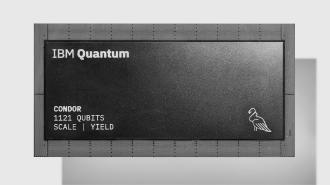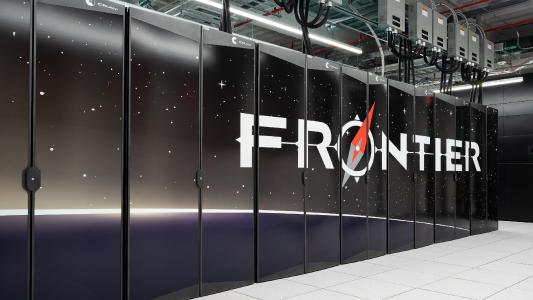IBM is pushing the field of quantum computing forward with Condor, the world’s largest quantum chip, and Heron, the company’s best-performing quantum chip to date.
Quantum computing 101: Classical computers use binary digits, or “bits,” to process and store data. These are the computers’ most basic units of information, and they exist in only two states: on or off (represented as the digits 1 and 0, respectively).
Quantum computers can rapidly perform some calculations that would be too time-consuming for classical computers.
The most basic unit of information in a quantum computer is a “qubit,” and thanks to the weird way matter functions at the atomic and subatomic scale, a qubit can be on, off, both, or neither at any given time.
This allows quantum computers to rapidly perform some calculations that would be too time-consuming for classical computers, which could lead to breakthroughs in everything from astronomy to medicine and beyond.
The challenge: The more qubits in a quantum computer, the more powerful it is, but qubits are unstable and prone to error. In 2022, IBM set a world record with a 433-qubit quantum chip, but experts predict we’ll need a lot more qubits before quantum computers can make good on their promise.
“The most disruptive applications for quantum computers are sitting firmly within the million or many millions of qubits domain,” Winfried Hensinger, director of the University of Sussex’s Centre for Quantum Technologies, told New Scientist.
“As excited as we are about Condor, we’re even more excited about Heron.”
Dario Gil
What’s new? It’s hard to say how long it’ll take us to develop those game-changing systems, but in May, IBM announced its intention to develop a 100,000-qubit system by 2033. It’s now a step closer to that goal with Condor, a 1,121-qubit chip unveiled at the IBM Quantum Summit 2023.
“[Condor’s] explicit goal was to push the limits of how many qubits could we put on a single chip … push the boundaries of everything to understand where things break,” Jerry Chow, director of quantum systems at IBM, told the Verge.
IBM also used the Summit to unveil Heron, a 133-qubit chip that performs 3 to 5 times better than Eagle, IBM’s previous “flagship” quantum chip. Heron will be accessible to IBM customers through its cloud platform, according to Chow.
“As excited as we are about Condor, we’re even more excited about Heron,” Dario Gil, IBM’s senior VP and director of research, said at the Summit. “[It’s] the most performant quantum processor in the world, and the one that will truly scale quantum computing.”
Looking ahead: IBM says it already has three Heron chips powering a new quantum computing platform — IBM Quantum System Two — at its lab in Yorktown Heights, New York.
According to IBM, Quantum System Two is the world’s first modular, utility-scale quantum computer system. The company plans to continue upgrading it with new tech over at least the next five years as it strives to reach its 100,000-qubit goal in 2033.
We’d love to hear from you! If you have a comment about this article or if you have a tip for a future Freethink story, please email us at [email protected].





